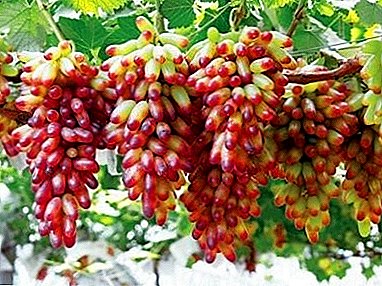
Japanese breeders have created a new hybrid grape variety, characterized by a very original appearance and unique taste.
Appearing on the market, he immediately caused a sensation among winegrowers for their unique qualities.
A high price of seedlings is a deterrent factor for its wide distribution in the post-Soviet space.
Currently, Ukrainian grape plants also began to grow seedlings of these grapes, which significantly reduced the cost of planting material.
a brief description of
Grapes Manicure Finger refers to table finger varieties. However, there is no way to uniquely attribute it to either white or red grape varieties.
Similar in appearance with these grapes are Black Finger, Witch fingers, and Lady fingers.
Its elongated fruits at the base have a light color, and on the tips are painted red. Thus, the berries are surprisingly similar to female fingers, decorated with bright nail polish.
The variety is also known as Finger nail.
Additional Information
Processing gibberellins allowed to reach seedlessness of the berries, which makes it possible to attribute it to the relatively ramish varieties.
Natural kishmish are Attica, Kishmish Century, Arsenyevsky and Kishmish Nakhodka.
History of breeding and distribution
 Finger manicure was obtained at the Japanese Grape Research Institute in 1988 from crossing Unicorn No.2 with variety Baladi.
Finger manicure was obtained at the Japanese Grape Research Institute in 1988 from crossing Unicorn No.2 with variety Baladi.
In 1998, it began to be cultivated in China.
Now China is one of the main suppliers of vine and cuttings of the variety to the international market.
Recently, one of the farms in the Kharkiv region of Ukraine is engaged in growing seedlings.
Grape Manicure Finger: variety description
The growth force of the bush is much higher than average. It is recommended to grow it on the T-shaped trellis or arbor, forming a vine in the form of a wide fan.
Finger Manicure flowers are bisexual, the degree of their pollination is quite high.
Also, bisexual flowers have Gurzuf Pink, Russian Corinka and Galahad.
Medium density clusters have an elongated shape, close to cylindrical, very attractive in appearance.
The average mass of bunches 700 grams. The maximum marked bunch mass is 2 kg.
As it ripens, the red color progresses higher and higher along the berry, reaching with the middle of the fruit when it is fully ripe.
The length of the berries - up to 5.8 cm, width - up to 3 cm. The average mass of berries - 12, 6 grams, maximum - 20 grams. The taste of the fruit is sweet and refreshing, very harmonious.
Black Raven, Victoria and Velika can also boast excellent taste.
The sugar content in the berries of the variety is about 17,5 %. Fruit acidity is estimated at 6.1 grams per liter. The flesh is firm and juicy, crispy. Berries are covered with dense, but thin peel.
During the meal, the skin is practically not felt.
A photo
Photo grapes "Manicure Finger":


Features of growing
The grapes in terms of ripening attributed to the middle and middle-late varieties.
When growing it in Novocherkassk, the crop ripened in mid-September.
Vine maturity is characterized as average or below average. Frost resistance is rather low, it is recommended to cover the bushes for the winter.
Love for warmth is demonstrated by such varieties as Hadji Murat, Cardinal and Ruta.
The strong growth of the vine and the good set of fruits of this grape variety create the risk of overloading the bush. Therefore, the cultivation of Manicure Finger vine requires a fairly strong formative pruning.
Amethyst Novocherkassky, Brilliant and Demeter also need forming.
After pruning, no more than 6–8 buds or less should be left to prevent overloading. Fertility coefficient is 1.3-1.5.
This variety begins to bear fruit the next year after planting. The average yield of berries from the bush is equal to 4-5 kilograms. Maximum yield from a bush - up to 20 kilogram.
Thanks to the thin, but dense peel of the fruit and sufficiently dense pulp, the grapes are well transported and well stored.
Diseases and pests
 The ability of a variety to resist diseases is low.
The ability of a variety to resist diseases is low.
Especially the Manicure Finger is prone to anthracnose and white rot. To avoid the defeat of these diseases for the season, you need to carry out 2-3 treatments with appropriate drugs.
Preventive treatment against mildew and oidium will not interfere.
The particular susceptibility of this grape to insect pests is not noted, which, apparently, is due to its still narrow distribution in our country.
Nevertheless, it can be expected that a grape variety with such unique characteristics will soon become widespread in our latitudes.
The hassles associated with its cultivation (shelter, processing) and so far the rather high cost of seedlings is fully compensated by its delightful appearance, high transportability and good taste.












